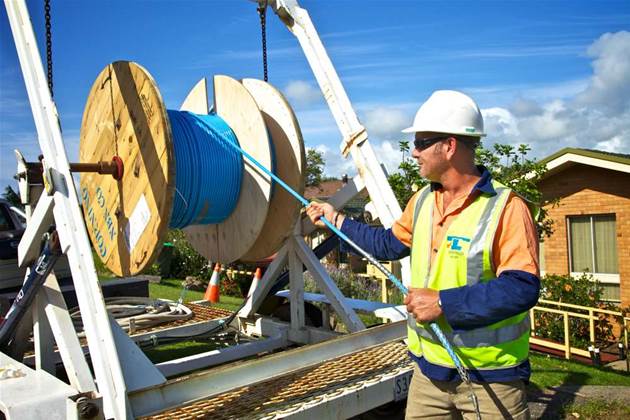NBN Co has started design and construction work to roll out fibre-to-the-basement to around 6000 apartments across Sydney, Melbourne and the ACT.

The 43 apartment blocks will be the first to be connected to the NBN via fibre-to-the-basement (FTTB) technology.
The first 2000 apartments are forecast to be ready for service by the end of March, and NBN Co expects the remaining 4000 will be ready by the end of June.
NBN Co will target the Sydney CBD, Balmain, Elizabeth Bay, Erskineville, Haymarket, Rushcutters Bay, Potts Point, Pyrmont, Randwick, Mascot, Alexandria, and St Leonards in New South Wales. TPG is also rolling out FTTB to Pyrmont and the Sydney CBD.
In Victoria, NBN Co will roll out FTTB to Carlton, Keysborough and Brunswick, and to Civic in the ACT.
NBN Co starting trialling FTTB technology more than a year ago in response to the competitive threat posed by internet service provider TPG and its efforts to connect 500,000 city apartments with its own FTTB services.
NBN Co started business readiness testing and retail service provider onboarding this month ahead of a planned March FTTB product release.
NBN Co's FTTB pilot - involving 45 end-users in inner-city Melbourne - reported peak average download speeds of 89 Mbps and average upload speeds of 36 Mbps.
The federal government moved to block TPG's efforts late last year by introducing a new carrier licence condition that would force TPG to provide wholesale access on its network and structurally separate its retail and wholesale businesses.
Earlier this month TPG suspended sales of its FTTB product after claiming it had not been given enough time to develop a wholesale product before the Government's mandated January 1 2015 deadline.
TPG told Govt it wouldn't be able to meet deadline
TPG warned Communications Minister Malcolm Turnbull late last year it would not be able to meet the January 1 deadline, and asked him to hold off on introducing the license while the company completed a wholesale product it had already started developing.
In its submission [pdf] to the Government's draft carrier license condition (CLC) process, which ran prior to the introduction of the condition, TPG said the proposal did not give affected carriers enough time to meet the new requirements.
TPG general counsel Tony Moffat said the company was already developing a wholesale product but would need more than a few weeks to implement the offering.
"The product would have been very attractive to wholesale customers," Moffat wrote.
"Once the draft CLC was issued, we were forced to put the implementation of that development work on hold. It would be impossible for us to offer the product at the price point if the CLC is implemented, since the costs associated with compliance with the CLC are huge."
Moffat said TPG's wholesale product would have offered a $40 monthly price point with 100Mbps download speeds and backhaul at no additional cost.
He argued that product represented a better offer than the $27 monthly product put forward in the Government's carrier license condition, which doesn't include backhaul and only offers 25Mbps/5Mbps speeds.
He criticised the Government for lumping harsher regulations on TPG than it had with incumbent Telstra, and argued that such a license condition should only be introduced at the time market failure occurs.
"Even now, in 2014, Telstra is not subject to the same conditions as the draft CLC would impose on TPG," Moffat wrote.
"Surely, if Telstra is given 17 years before it is finally required functionally or structurally to separate, TPG should be given at least the opportunity to show that it will not treat its wholesale customers with the type of disregard that should demand regulation.
"If in a few months TPG failed to offer a product with the above characteristics, or was otherwise shown to be unfairly treating its wholesale customers, then an appropriate measure might be considered at that time."





_(23).jpg&h=140&w=231&c=1&s=0)





 iTnews Benchmark Awards 2026
iTnews Benchmark Awards 2026
 iTnews Executive Retreat - Security Leaders Edition
iTnews Executive Retreat - Security Leaders Edition
 iTnews Cloud Covered Breakfast Summit
iTnews Cloud Covered Breakfast Summit
 The 2026 iAwards
The 2026 iAwards












_(1).jpg&h=140&w=231&c=1&s=0)



